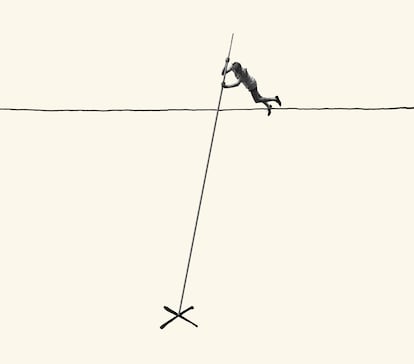The Stutz method: A simple approach to deal with the victimizing thoughts that hold us back
A Netflix documentary has popularized the theories of a New York psychiatrist on how to use our inner strength to face difficulties

A little over a decade ago, a book called The Tools was published, written by Phil Stutz in collaboration with Barry Michels. However, this manual of practical psychology went unnoticed by many until last year, when the documentary Stutz was released on Netflix, directed by actor Jonah Hill, who also plays the role of an interviewer for his therapist: Stutz himself, a New York psychiatrist based in Los Angeles, where he treats numerous Hollywood stars. In the documentary, the psychiatrist appears as a skinny man with a penetrating gaze. We can see a slight tremor in his arm due to Parkinson’s, a disease he has suffered for a long time. The conversation takes place informally; Stutz takes issue with the therapists who make their patients talk and return nothing but silence.
Jonah Hill nods in agreement, noting the irony: “Your friends, who are idiots, give you advice. Unsolicited. And you want your friends just to listen. And you want your therapist to give you advice,” he says, “and they just listen.” The protagonist of the documentary smiles and acknowledges that when a patient is not very proactive, he has no qualms about telling them: “Do what the fuck I tell you! I guarantee you’ll feel better.”
These tips, or practical steps, are what Stutz calls “tools.” For example, when we go through a phase of despondency or even depression, our natural tendency is to go into a hole, which is the opposite of what we need. In a person with an anxiety crisis, not going out into the street will reinforce the phobia, limiting their autonomy more and more.
To get out of the predicament, Stutz recommends using the life force that we all possess and that, with a trembling hand, he draws as a pyramid with three tiers – “body,” “people” and “yourself.” Let’s see how each one of them can feed our desire to live:
Body
The base of the pyramid. The first step to notice an improvement in our mood is to monitor three aspects that affect the body: movement, diet and sleep. According to Stutz, 85% of our well-being depends on exercising daily, nourishing ourselves adequately and sleeping the necessary hours. When we feel prey to negative emotions, this is where we must start, since it is in our power to improve the base of our self-care.
People
Anxious or depressed people tend to avoid social contact, when it is actually in their best interest. The psychiatrist says that relationships are like the handholds when one climbs a mountain; we need them in order to avoid falling into an abyss of loneliness and repetitive thoughts. In moments of great unease, he even recommends meeting with someone that we do not find interesting, as “that person represents the whole human race.” This connection also feeds our life force.
Yourself
When the body and social ties are well cared for, at the top of the pyramid remains your relationship with yourself. Many times we cannot solve our problems because we do not know ourselves well enough. To connect with who you are, the tool he recommends is writing. Even if it is just some messy notes on a piece of paper or a text file, through writing, themes and nuances emerge that will give us clues to deal with the challenge we are facing.
In addition to cultivating this basic pyramid of personal well-being, Stutz warns against the mental dynamics that lead us into the maze – as he represents victimizing thoughts. The damage that an accident or an affront can cause us is directly proportional to the mental energy that we devote to it. If we turn the page, our life can go on as if nothing had happened. On the other hand, if we give it prominence and it becomes a victim loop, we will lose ourselves in the maze. And being stuck in the maze, in his own words, “puts your life on hold.”
For this reason, our mental and existential freedom depends on taking care of each thing in due time and then letting go to move on with our lives.
Francesc Miralles is a writer and journalist who is an expert in psychology.
Sign up for our weekly newsletter to get more English-language news coverage from EL PAÍS USA Edition
Tu suscripción se está usando en otro dispositivo
¿Quieres añadir otro usuario a tu suscripción?
Si continúas leyendo en este dispositivo, no se podrá leer en el otro.
FlechaTu suscripción se está usando en otro dispositivo y solo puedes acceder a EL PAÍS desde un dispositivo a la vez.
Si quieres compartir tu cuenta, cambia tu suscripción a la modalidad Premium, así podrás añadir otro usuario. Cada uno accederá con su propia cuenta de email, lo que os permitirá personalizar vuestra experiencia en EL PAÍS.
¿Tienes una suscripción de empresa? Accede aquí para contratar más cuentas.
En el caso de no saber quién está usando tu cuenta, te recomendamos cambiar tu contraseña aquí.
Si decides continuar compartiendo tu cuenta, este mensaje se mostrará en tu dispositivo y en el de la otra persona que está usando tu cuenta de forma indefinida, afectando a tu experiencia de lectura. Puedes consultar aquí los términos y condiciones de la suscripción digital.








































